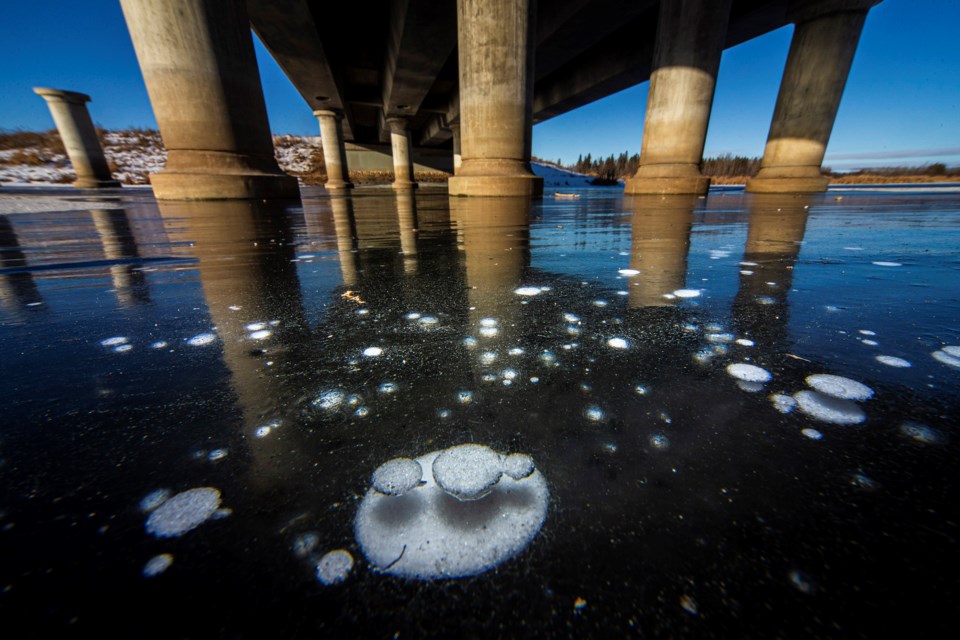In the past week, St. Albert has been under an extreme cold warning where the wind chill made temperatures feel like -45 C. On Wednesday night, it was one of the coldest places on Earth.
The cross-polar flow hanging over the Northern Hemisphere has sparked warnings not only about vehicle maintenance but also about potential health risks brought on by the cold.
Emergency Medical Services, contracted through Alberta Health Services, received 40 cold-related calls throughout the Edmonton metro region within the past week. Statistics did not list which hospitals patients were escorted to.
“Normally we receive one or two calls a day,” said Alex Campbell, EMS public education officer/paramedic.
Nearly half the calls were from passersby who spotted individuals appearing to require assistance. However, once paramedics arrived, they were gone, Campbell said.
“The other 20 had mild frostbite or were suffering from hypothermia. They were inadequately prepared for the cold. If the issue wasn’t serious, we would give them a ride home, or if they were homeless, we would take them to a shelter.”
He added there is a trend among young people to wear shorts, a fad that in this bitter cold can cause acute skin damage.
“Anecdotally, I heard of (a) young person wearing short pants and riding her bike to school, and she got frostbite. Again, this is just anecdotally.”
Winter’s grip also sees an increase in heart attacks and chest pains, particularly after a snowfall. The dip in temperatures constricts blood vessels. As an individual exercises shoveling snow, blood pressure rises quickly. The heart is forced to work overtime as the body’s arteries narrow decreasing blood flow.
Campbell mentioned statistics on individuals treated for heart issues do not list whether it was a cold-related cause or a separate issue. He adds it is important to dress warmly and pace yourself when working outdoors.
On the bright side, tumbles decreased.
“Overall slips and falls are lower than our normal call volume. Less people are venturing out. Everyone is hunkering down. People aren’t going out unless they have to. Roads are treacherous and vehicles can be difficult to start.”
Individuals also need to be vigilant about carbon monoxide (CO) poisoning whether in the home, garage or vehicle. EMTs received one call to a house and one to a vehicle.
“I don’t recommend using propane or kerosene in the home,” said Campbell, noting those are CO emitters.
He also advocates against leaving a vehicle in the garage while it is running.
“Make sure it is pulled outside. It (CO) can fill up a garage quickly and it circulates through your car sucked in by the exhaust. At high levels, you can succumb in seconds.”
Carbon monoxide poisoning symptoms include headache, nausea, dizziness and flushed skin.
“When inhaled, carbon monoxide sticks to the red blood cells and replaces oxygen in the blood. It causes skin to redden.” It also prevents the flow of oxygen to the heart, brain and other vital organs.
As a precaution, Campbell suggests drivers put an extra set of cold winter gear in their vehicle.
“If you get stranded or if your car slides into a ditch, you can get cold really fast. Your cellphone may not be working and you may have to wait a while. Not this year, but in past years we’ve found people in their vehicle suffering frostbite.”
To prevent cold-related injuries, Campbell recommends indoor activities or dressing in layers when outdoors, staying well-hydrated and limiting alcohol consumption.
“Alcohol interferes with your body’s ability to regulate temperature.”
If you spot anyone who looks as if they need assistance, call 211. It is a 24-hour information and referral line that will connect you to appropriate services.
If you see anyone that requires medical attention, call 911.




